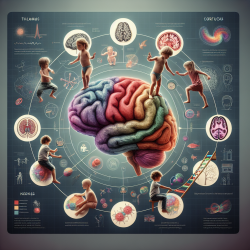Introduction
Adverse Childhood Experiences (ACEs) have been shown to have a profound impact on cognitive flexibility, a crucial executive function associated with positive outcomes in adulthood. A recent study titled Adverse childhood experiences (ACEs) associated with reduced cognitive flexibility in both college and community samples provides valuable insights into this association, emphasizing the need for practitioners to integrate these findings into their therapeutic practices.
Understanding ACEs and Cognitive Flexibility
ACEs encompass various forms of early life adversity, such as abuse, neglect, and household dysfunction. These experiences can disrupt the normative development of the prefrontal cortex, a brain region integral to executive functions, including cognitive flexibility. Cognitive flexibility refers to the ability to adapt one's thinking and behavior in response to changing environments and rules, a skill that is crucial for successful navigation of life's challenges.
Key Findings from the Study
The study conducted by Kalia et al. (2021) examined the relationship between ACEs and cognitive flexibility using the Wisconsin Card Sorting Test (WCST) across two samples: college students and community adults. The findings revealed that a higher number of ACEs correlated with lower cognitive flexibility, as evidenced by fewer completed categories on the WCST.
- ACEs were negatively associated with cognitive flexibility in both college students and adults.
- Perceived chronic stress was positively correlated with ACEs, though it did not directly impact cognitive flexibility.
- Age was found to negatively correlate with cognitive flexibility, highlighting the importance of early intervention.
Implications for Practitioners
For speech-language pathologists and other practitioners working with children, these findings underscore the importance of early identification and intervention for those exposed to ACEs. Here are several strategies to enhance cognitive flexibility in children:
- Incorporate Cognitive Flexibility Exercises: Engage children in activities that require them to switch between different tasks or rules, such as sorting games or puzzles.
- Foster a Supportive Environment: Create a safe and nurturing environment that reduces stress and promotes adaptive coping strategies.
- Utilize Technology: Leverage online therapy platforms like TinyEYE to provide consistent support and resources tailored to each child's needs.
- Collaborate with Families: Educate families about the impact of ACEs and involve them in the therapeutic process to reinforce skills at home.
Encouraging Further Research
While this study provides crucial insights, it also highlights the need for further research to explore the nuances of cognitive flexibility and its relationship with ACEs. Practitioners are encouraged to contribute to this growing body of knowledge by conducting longitudinal studies and exploring interventions that can mitigate the effects of ACEs on cognitive development.
Conclusion
Understanding the impact of ACEs on cognitive flexibility is essential for practitioners aiming to foster positive developmental outcomes in children. By integrating data-driven strategies and promoting further research, we can empower children to overcome adversity and thrive in their environments.
To read the original research paper, please follow this link: Adverse childhood experiences (ACEs) associated with reduced cognitive flexibility in both college and community samples.










